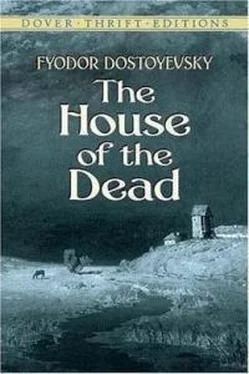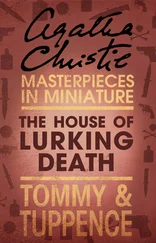Федор Достоевский - The House of the Dead
Здесь есть возможность читать онлайн «Федор Достоевский - The House of the Dead» весь текст электронной книги совершенно бесплатно (целиком полную версию без сокращений). В некоторых случаях можно слушать аудио, скачать через торрент в формате fb2 и присутствует краткое содержание. Год выпуска: 2014, Издательство: epubBooks Classics, Жанр: Русская классическая проза, на английском языке. Описание произведения, (предисловие) а так же отзывы посетителей доступны на портале библиотеки ЛибКат.
- Название:The House of the Dead
- Автор:
- Издательство:epubBooks Classics
- Жанр:
- Год:2014
- ISBN:нет данных
- Рейтинг книги:4 / 5. Голосов: 1
-
Избранное:Добавить в избранное
- Отзывы:
-
Ваша оценка:
- 80
- 1
- 2
- 3
- 4
- 5
The House of the Dead: краткое содержание, описание и аннотация
Предлагаем к чтению аннотацию, описание, краткое содержание или предисловие (зависит от того, что написал сам автор книги «The House of the Dead»). Если вы не нашли необходимую информацию о книге — напишите в комментариях, мы постараемся отыскать её.
The House of the Dead — читать онлайн бесплатно полную книгу (весь текст) целиком
Ниже представлен текст книги, разбитый по страницам. Система сохранения места последней прочитанной страницы, позволяет с удобством читать онлайн бесплатно книгу «The House of the Dead», без необходимости каждый раз заново искать на чём Вы остановились. Поставьте закладку, и сможете в любой момент перейти на страницу, на которой закончили чтение.
Интервал:
Закладка:
If, then, it is the case that we nobles were treated with special consideration in the establishment I was confined in, which was under direct control of the Governor–General, and administered entirely on military principles, there must have been some greater kindliness in the treatment of the convicts of the first and third category or class. I think I can speak with some authority about what went on throughout Siberia in these respects, and I based my views, as to this, upon all that I heard from convicts of these classes. We, in our prison, were under much more rigorous surveillance than was elsewhere practised; we were favoured with no sort of exemptions from the ordinary rules as regards work and confinement, and the wearing of chains; we could not do anything for ourselves to get immunity from the rules, for I, at least, knew quite well that, in the good old time which was quite of yesterday , there had been so much intriguing to undermine the credit of officials that the authorities were greatly afraid of informers, and that, as things stood, to show indulgence to a convict was regarded as a crime. Everybody, therefore, authorities and convicts alike, was in fear of what might happen; we of the nobles were thus quite down to the level of the other convicts; the only point we were favoured in was in regard to corporal punishment—but I think that we should have had even that inflicted on us had we done anything for which it was prescribed, for equality as to punishment was strictly enjoined or practised; what I mean is, that we were not wantonly, causelessly, mishandled like the other prisoners.
When the Governor got to know of the punishment inflicted on J—ski, he was seriously angry with the Major, and ordered him to be more careful for the future. The thing got very generally known. We learned also that the Governor–General, who had great confidence in our Major, and who liked him because of his exact observance of legal bounds, and thought highly of his qualities in the service, gave him a sharp scolding. And our Major took the lesson to heart. I have no doubt it was this prevented his having M—ski beaten, which he would much have liked to do, being much influenced by the slanderous things A—f said about M―; but the Major could never get a fair pretext for doing so, however much he persecuted and set spies upon his proposed victim; so he had to deny himself that pleasure. The J—ski affair became known all through the town, and public opinion condemned the Major; some persons reproached him openly for what he had done, and some even insulted him.
The first occasion on which the man crossed my path may as well be mentioned. We had alarming things reported to us—to me and another nobleman under sentence—about the abominable character of this man, while we were still at Tobolsk. Men who had been sentenced a long while back to twenty–five years of the misery, nobles as we were, and who had visited us so kindly during our provisional sojourn in the first prison, had warned us what sort of man we were to be under; they had also promised to do all they could for us with their friends to see that he hurt us as little as possible. And, in fact, they did write to the three daughters of the Governor–General, who, I believe, interceded on our behalf with their father. But what could he do? No more, of course, than tell the Major to be fair in applying the rules and regulations to our case. It was about three in the afternoon that my companion and myself arrived in the town; our escort took us at once to our tyrant. We remained waiting for him in the ante–chamber while they went to find the next–in–command at the prison. As soon as the latter had come, in walked the Major. We saw an inflamed scarlet face that boded no good, and affected us quite painfully; he seemed like a sort of spider about to throw itself on a poor fly wriggling in its web.
"What's your name, man?" said he to my companion. He spoke with a harsh, jerky voice, as if he wanted to overawe us.
My friend gave his name.
"And you?" said he, turning to me and glaring at me behind his spectacles.
I gave mine.
"Sergeant! take 'em to the prison, and let 'em be shaved at the guard–house, civilian–fashion, hair off half their skulls, and let 'em be put in irons to–morrow. Why, what sort of cloaks have you got there?" said he brutally, when he saw the gray cloaks with yellow sewn at the back which they had given to us at Tobolsk. "Why, that's a new uniform, begad—a new uniform! They're always getting up something or other. That's a Petersburg trick," he said, as he inspected us one after the other. "Got anything with them?" he said abruptly to the gendarme who escorted us.
"They've got their own clothes, your worship," replied he; and the man carried arms, just as if on parade, not without a nervous tremor. Everybody knew the fellow, and was afraid of him.
"Take their clothes away from them. They can't keep anything but their linen, their white things; take away all their coloured things if they've got any, and sell them off at the next sale, and put the money to the prison account. A convict has no property," said he, looking severely at us. "Hark ye! Behave prettily; don't let me have any complaining. If I do—cat–o'–nine–tails! The smallest offence, and to the sticks you go!"
This way of receiving me, so different from anything I had ever known, made me nearly ill that night. It was a frightful thing to happen at the very moment of entering the infernal place. But I have already told that part of my story.
Thus we had no sort of exemption or immunity from any of the miseries inflicted there, no lightening of our labours when with the other convicts; but friends tried to help us by getting us sent for three months, B—ski and me, to the bureau of the Engineers, to do copying work. This was done quietly, and as much as possible kept from being talked about or observed. This piece of kindness was done for us by the head engineers, during the short time that Lieutenant–Colonel G—kof was Governor at our prison. This gentleman had command there only for six short months, for he soon went back to Russia. He really seemed to us all like an angel of goodness sent from heaven, and the feeling for him among the convicts was of the strongest kind; it was not mere love, it was something like adoration. I cannot help saying so. How he did it I don't know, but their hearts went out to him from the moment they first set eyes on him.
"He's more like a father than anything else," the prisoners kept continually saying during all the time he was there at the head of the engineering department. He was a brilliant, joyous fellow. He was of low stature, with a bold, confident expression, and he was all gracious kindness to the convicts, for whom he really did seem to entertain a fatherly sort of affection. How was it he was so fond of them? It is hard to say, but he seemed never to be able to pass a prisoner without a bit of pleasant talk and a little laughing and joking together. There was nothing that smacked of authority in his pleasantries, nothing that reminded them of his position over them. He behaved just as if he was one of themselves. In spite of this kind condescension, I don't remember any one of the convicts ever failing in respect to him or taking the slightest liberty—quite the other way. The convict's face would light up in a wonderful, sudden way when he met the Governor; it was odd to see how the face smiled all over, and the hand went to the cap, when the Governor was seen in the distance making for the poor man. A word from him was regarded as a signal honour. There are some people like that, who know how to win all hearts.
G—kof had a bold, jaunty air, walked with long strides, holding himself very straight; "a regular eagle," the convicts used to call him. He could not do much to lighten their lot materially, for his office was that of superintending the engineering work, which had to be done in ways and quantities, settled absolutely and unalterably by the regulations. But if he happened to come across a gang of convicts who had actually got through their work, he allowed them to go back to quarters before beat of drum, without waiting for the regulation moment. The prisoners loved him for the confidence he showed in them, and because of his aversion for all mean, trifling interferences with them, which are so irritating when prison superiors are addicted to that sort of thing. I am absolutely certain that if he had lost a thousand roubles in notes, there was not a thief in the prison, however hardened, who would not have brought them to him, if the man lit on them. I am sure of it.
Читать дальшеИнтервал:
Закладка:
Похожие книги на «The House of the Dead»
Представляем Вашему вниманию похожие книги на «The House of the Dead» списком для выбора. Мы отобрали схожую по названию и смыслу литературу в надежде предоставить читателям больше вариантов отыскать новые, интересные, ещё непрочитанные произведения.
Обсуждение, отзывы о книге «The House of the Dead» и просто собственные мнения читателей. Оставьте ваши комментарии, напишите, что Вы думаете о произведении, его смысле или главных героях. Укажите что конкретно понравилось, а что нет, и почему Вы так считаете.












